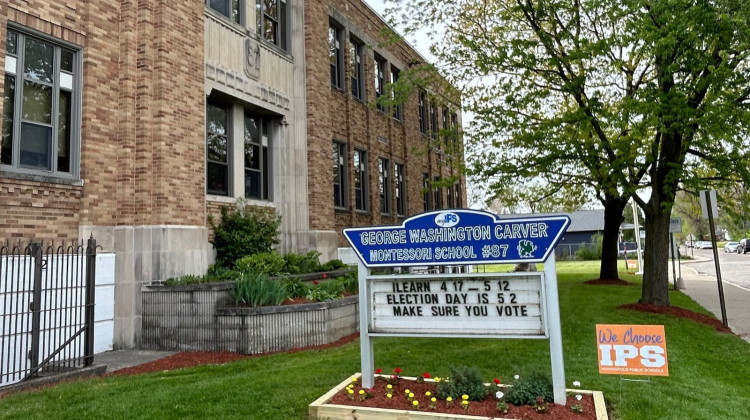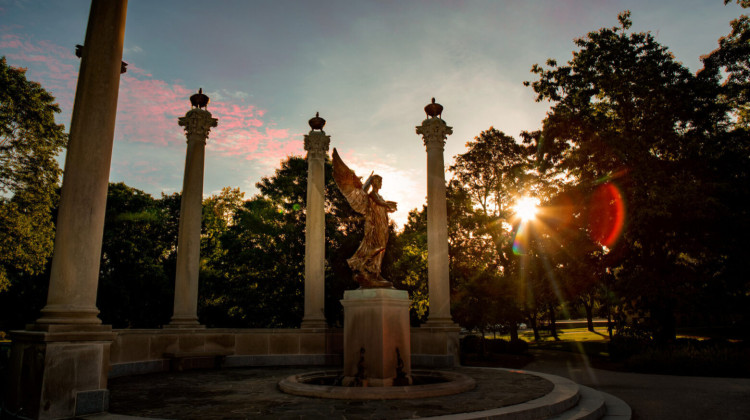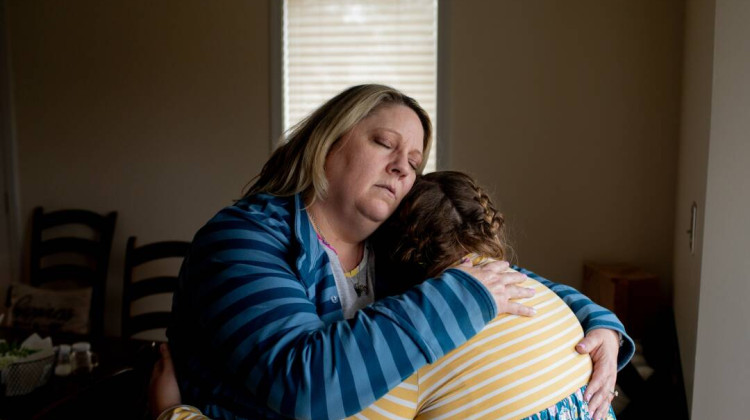
Daria Parham, the principal of Paul I. Miller School 114, stands in front of a school sign on Tuesday, Nov. 1, 2022. The Indianapolis Public Schools administration has proposed a plan that includes closing the building that house School 14 and merging the academic program into another school.
Elizabeth Gabriel/WFYI NewsDaria Parham is the Indianapolis Public Schools district’s 2023 principal of the year. She was awarded the honor during her seventh year as principal of Paul Miller School 114, an elementary school on the Near Southeast side. Next year she could lead even more students. This fall IPS announced a plan that could potentially close and merge some buildings this spring – including the merger of School 114 with Frederick Douglass SUPER School 19. Now the district's principal of the year could be in charge of bringing the two school communities together.
Some School 19 parents and teachers have been concerned about Parham’s ability to support English Language Learners. School 19 has nearly three times the number of non-English speakers compared to School 114.
WFYI’s Elizabeth Gabriel interviewed Parhamabout her experience at School 114, and her plans to support students at School 19 if the schools merge. This interview has been condensed and edited for clarity.
Elizabeth Gabriel: How long have you worked in education and why were you inspired to work with students?
Daria Parham: So I have always been with IPS – it'll be 19 years in January. From a little girl, I've always wanted to be a teacher. And I'm a product of IPS. I went to IPS schools for basically my entire youth. I graduated from Broad Ripple High School, I'm a proud Rocket, and I knew I always wanted to come back to IPS. I just enjoy the relationships I get to build with my students and truly seeing the difference that I make with them. Academically and socially, I see their growth as well.
Gabriel: You've worked at School 114 for seven years. What's the biggest challenge you found and a solution to the challenge during your time at the school?
Parham: I would have to say starting off, like my first couple of years here, I was pretty young. A lot of my staff here have been here for 20, almost 30 years. So just really showing them that I knew what I was doing, honestly, that was the biggest challenge for me. But I quickly learned that in order for them to trust me, I had to trust them. So allowing them to do what they do, and helping to guide them. So really just meeting them where they are and helping to guide them to get them to make progress to meet our students needs. That's really how we overcame that challenge.
Gabriel: And School 114 had the largest IPS improvements in on grade level reading and math scores last year. What are your strategies to improve academic outcomes for all students?
Parham: Well, we first start off by making sure students know where they are, right. So students have to know like, this is where my reading level is, this is where I am performing for my math. They take an assessment called NWEA. So students get a score at the beginning of the year and then we have data talks every quarter. So we talk about grades from the previous quarter, any scores the student has received. And then we set goals with our students and we set action plans.
So when students meet their goals we celebrate. So we have what we call, it's kind of like Wheel of Fortune. So students get prizes when they spend the wheel for meeting their goals. And then sometimes just even in the hallway, they'll stop me and say, “Hey, Ms. Parham, I met my NWEA goal.” And, you know, I'll give them a high five and I'll make a big deal out of it every single time because I really want them to know the importance of that. So, again, going back to just making sure kids know where they are and know what their goals are. And then also really cultivating my teachers as well. So helping them understand how to meet students' needs.
Gabriel: And then IPS has proposed a plan to merge School 114 with School 19. Some parents from School 19 are concerned about your ability to help English language learners since your school only serves about 8 percent non-English speakers and School 19 serves about 30 percent. How do you plan to support this population of students and their families?
Parham: One thing that I know for sure is best practices are best practices. So we have a really strong foundation, and again, meeting students where they are and helping them to achieve their goals. So I feel like my staff has a strong foundation in just those best practices anyway, so we can just carry that over to meet the needs of the students at School 19. Also, in the near future, my team will be doing SIOP [Sheltered Instruction Observation Protocol] training (, which is a method for instructing students who are English language learners. So we've already started planning things that we can do to specifically meet students' needs that are English language learners. But also, I feel like myself – just personally – I'm really good about taking challenges on. So if that is a challenge, I'm gonna figure out what is best needed so that my teachers and my students have what they need to be successful.
Gabriel: That makes sense. Yeah. And earlier, you mentioned meeting students where they are, I guess, can you talk a little bit more about that, and like, what you've done to help meet students’ basic needs.
Gabriel: What will you do this school year and next school year to help students from both schools feel comfortable if the merger is approved?
Parham: Well, I want to do some things this year as far as like having some community events where we are incorporating both students from School 114 and School 19, some team building things. I am in the process of hiring a face liaison – basically our parent liaison to plan some events. I would like to have conversations with parents to find out what their needs are and specifically what things they enjoy about what's happening at [School] 19 so that we can carry some of those things over so there's still some kind of continuity there and it'll make the transition even smoother. And then for the students, I would like to have some conversations with students too to see what they would like to happen.
But in the beginning of the year, I am planning to do a lot of community building within the classrooms, within special areas and things like that. And then also, helping people to understand the vision and the mission that we have. And it's just about all of our students. So it's not, ‘Well, these are [School] 114 kids, and these are [School] 19 kids.’ We're all together and we're all working toward the same goal.
Gabriel: Great. And congratulations again and thank you for speaking with me.
Parham: Thank you for coming up. I appreciate it. Oh, thank you.
Contact WFYI education reporter Elizabeth Gabriel at egabriel@wfyi.org. Follow on Twitter: @_elizabethgabs.
 DONATE
DONATE






 Support WFYI. We can't do it without you.
Support WFYI. We can't do it without you.